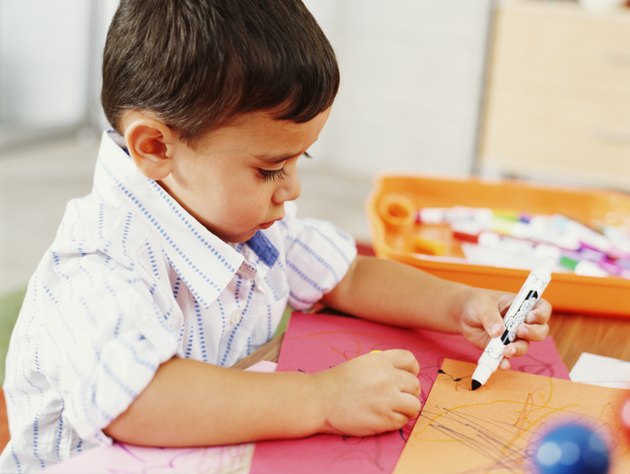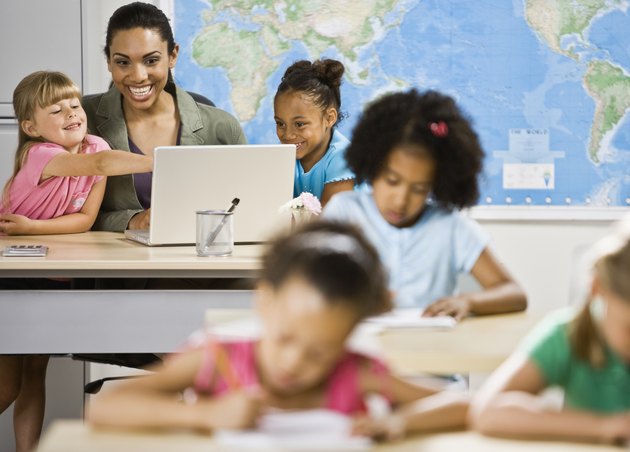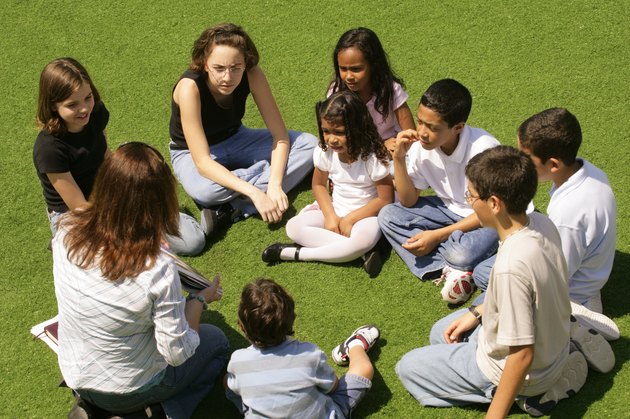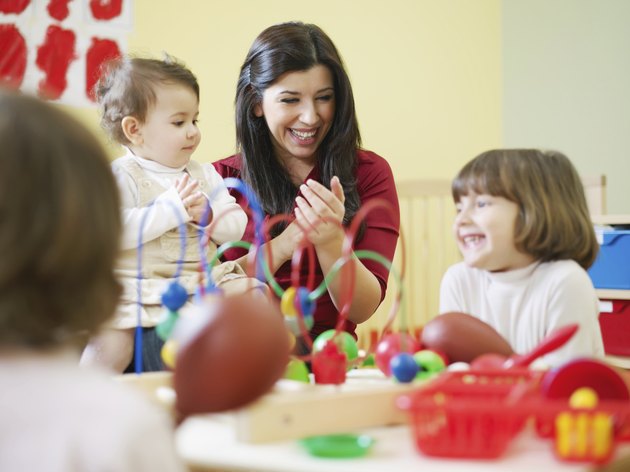Early
childhood education is beneficial for children ages 3, 4 and 5. It's
also often referred to as preschool, pre-kindergarten, day care, nursery
school or early education. No matter the name, each serves the same
purpose: to prepare young children for their transition into elementary
school. Sending your preschool-age child to one of these early childhood
education programs can make a positive impact on her and give her a
head start toward a bright future.

Learning and Development
The
capacity of your child's brain to soak up new learning peaks when your
child is 3 years old, according to Ready to Learn DC. At this point in
your child's life, she has the highest potential for learning new
things. While attending an early childhood education program, your child
will improve her language and motor skills, while developing the
learning and cognitive skills necessary to move on to primary school,
states the Rural Education Action Program at Stanford University.
Health Benefits
Attending
a quality early childhood education program can benefit your child's
health as well. Approximately 60 to 70 percent of preschool-age children
attend an early childhood program or child care program out of the
home, according to the American Academy of Pediatrics. Studies show that
being provided with quality care in those programs can positively
influence your child's learning and development. In addition, your
child's socio-emotional development is less likely to be adversely
affected, with a decreased chance of needing behavioral or mental health
care once she enters primary school.
Importance of Screenings
One
of the many benefits of your child receiving an early childhood
education is the opportunity to participate in early childhood
screening. This screening is provided for 3- to 5-year-olds and tests
things like health, cognitive development, speech, vision, hearing,
coordination, emotional skills and social skills, notes Education.com.
Screenings can identify any development or health issues that need to be
taken into consideration, to prevent learning delays.
Economic Benefits
Children
aren't the only ones that benefit from early childhood education
programs, states the National Institutes of Health. These programs can
have economic benefits as well. A study conducted by the NIH tracked
low-income families whose children received intensive early childhood
education, while their parents received parenting skills training,
social services and job skills training. The results showed that these
children went further with their education, had a higher income and
better health insurance coverage than those who didn't receive early
childhood education. These children were also less likely to abuse
alcohol or be arrested and incarcerated for a felony.

How Education Affects Early Childhood Development
Early
childhood education can impact a child's academic success and reduce
incidences of crime and delinquency, according to professor W. Steven
Barnett, author of "Preschool Education and Its Lasting Effects:
Research and Policy Implications," published by the National Institute
for Early Education Research. Children enrolled in early childhood
education programs may also receive direct benefits in behavior, thought
processes, socialization and learning capacity.

Impact of Preschool
Early
education can increase cognitive skills in children, according to the
authors of "Economics of Education Review," published in the February
2007 issue. Children from under-served communities who attended
preschool showed more cognitive improvement than their peers without
preschool. Columbia University researchers confirm this connection
through their study published in the July 2003 issue of "Developmental
Psychology." They found that prematurely born 8-year-olds who attended
400 or more days of preschool at ages 2 and 3 years old scored higher on
IQ tests than prematurely born 8-year-olds of similar backgrounds who
attended preschool less often.
What Preschool is Best?
But
just attending a preschool may not be enough. A child's development may
have just as much to do with what type of early learning environment he
is in. After entering kindergarten, children who had been enrolled in
preschool programs not located in public schools displayed more
behavioral problems than children who attended preschools located within
public schools. E.S. Peisner-Feinberg and his colleagues at the
University of North Carolina at Chapel Hill published a study in the
September/October issue of "Child Development" that showed that children
who attended high-quality community-based childcare centers behaved
better through second grade compared to children who had been enrolled
in lesser-quality daycare centers.
Positive Outcomes
Improved
cognitive skills can lead to improved academic results. Children
enrolled in prekindergarten performed better in reading and mathematics
when they entered grade school, state the authors of "Economics of
Education Review." Children enrolled in early childhood education
programs are less likely to be held back a grade in school, according to
the Public Policy Forum. These children also have a decreased
likelihood of being enrolled in special education remedial programs.
Beneficial Features of Preschool
Children
enrolled in high-quality daycare centers had better social skills than
children who were not enrolled in such centers, maintains
Peisner-Feinberg. He and his colleagues found that social skill
development was highest among children who formed close and affectionate
relationships with preschool or daycare center caregivers.
Positive Influences
Early
childhood education—received at home, in preschool, in a daycare center
or elsewhere—can affect a child’s physical, mental and emotional
development. The brain of a child reared in safe, loving and secure
environments is more likely to develop in a normal and healthy manner
compared to that of a child traumatized at least once, according to the
National Scientific Council on the Developing Child.

Goals for Early Childhood Education
If
you're the parent of a young child, you might be thinking of enrolling
him in a daycare, preschool or pre-kindergarten program to prepare him
for elementary school. These programs are typically run by those with
early childhood education certification and often offer more than just
playtime. Many programs will focus on teaching your little one the
skills needed to enter kindergarten. Before you choose an ECE program
for your child, ensure that your goals for align with the goals of the
facility you choose.

Social Skills
A
child enrolled in an ECE program like preschool has the chance to
interact with children her own age. Your child will learn conflict
management, problem solving skills and proper behavior when she spends
time with other children. Your goal as a parent or as an educator should
be to show children the right way to interact with each other, through
manners, sharing, problem solving and spending time together, notes the
North Central Regional Educational Laboratory. These skills will serve
your child well when it's time for elementary school.
Assessment
You
may not realize that your child has a learning disability or social
problem until he's properly placed in an ECE program. Structured
programs give teachers and parents a chance to assess each child's
strengths and weaknesses. A good ECE program should strive to seek out
each child's talents and find ways to teach to his weaknesses to create a
well-rounded student. An ECE teacher observes each child to identify
and support development and works with each child's parents to keep them
informed of growth and development, according to the Capistrano Unified
School District Early Childhood Education Program.
School Readiness
One
of the most important goals of an ECE program should be to get children
ready to transition into elementary school, notes the U.S. Department
of Education. ECE programs should help children prepare to learn by
teaching basic concepts like letters, colors and numbers. While reading
skills may not be an issue with younger children, listening skills will
be important for your child's future. It also gives children a chance to
separate from parents so that kindergarten isn't as much of a shock.
Schedule and Structure
ECE
programs should teach children about the importance of schedule and
structure. At home, a child may have all day to do whatever she wishes,
but in an ECE program, she'll learn about following a schedule and her
managing time. When she transitions to kindergarten, your child will be
better prepared to manage the structure of her day as she listens to her
teacher and follows instructions based on her daily school structure.


What are the Effects of the Home Environment on Learning?
Learning
is the process of absorbing new information in a meaningful way and
putting it to use. Children and young adults learn a large portion of
their knowledge at school. At school, previously unknown information is
deliberately presented to students so they can use it both to pass tests
and move on to other studies. This information is also used in myriad
of practical life applications. A child's home environment has
significant effects on learning and school performance.

Building Blocks for Learning
The
home environment provides the foundation for learning and is an element
of the student's life that can affect grades, according to the Arkansas
State Parental Information and Resource Center's Center for Effective
Parenting. Providing opportunities to learn outside of school helps
facilitate student success in the school environment, as reported by the
University of Minnesota Extension. Education success was positively
impacted by home learning opportunities such as parents reading to their
children, trips to the library, and resources encouraging play with
letters and numbers, according to education professionals reporting in
the "British Educational Research Journal." The British researchers
found that the mother's education level had the single most significant
impact on a young child's academic success.
Getting Ready to Learn
Parents
are responsible for ensuring that their children are well-fed,
well-rested, happy and calm, according to the Arkansas State Parental
Information and Resource Center. Creating a positive physical and mental
atmosphere in the home helps prepare students to be ready and able to
learn. A parent-child relationship characterized by nurturing,
acceptance and encouragement, as well as parents' responsiveness to the
child's needs, correlates with positive academic performance, according
to the University of Minnesota Extension. Parental overprotectiveness,
authoritarianism, disapproval and punishment often have a negative
correlation with student learning.
Mighty Motivation
A
student's learning success is enhanced when both parents and teachers
clearly state their goals for student performance, according to the
University of Minnesota Extension. Parents' positive aspirations for
their children, especially teens, has a strong relationship with
academic achievement. Motivation involves the student's own beliefs
about his skill level and what the results will be if he tries a new
task, notes the Arkansas State Parental Information and Resource Center.
Parental expectations and communication about the value of learning and
the child's skills have a powerful effect on the child's motivation to
learn.
Psychological Effects of Sending Children to Day Care
As
much as you would like to stay home with your child in his first few
years of life, financial needs may prevent you from leaving your job.
You're not alone. According to ChildStats.gov, many parents rely on
child care since they have to work. Their statistics show that in 2011,
49 percent of children 4 and younger were cared for by someone other
than their mother and 24 percent attend daycare, preschool or received
other types of center-based care. Sending your child to day care may be
tough for you, but a high-quality facility may offer your child
psychological benefits. Alternately, sending your child to a low-quality
day care could have a negative psychological impact.

Aggression
The
"Study of Early Child Care and Youth Development," supported by the
National Institute of Child Health and Human Development (NICHD), said
that children who spend time in day care may be more aggressive than
children who spend no time in day care. According to the study, the
number of hours a child spends in day care also affects his aggression
levels; the more hours he is there, the more aggressively he behaves.
However, some reject the statistical correlation as too small to be
presumed a fact.
Social Awareness
Children
who spend time in day care could be more socially aware than children
who spend no time in day care. According to Reuters, a 2010 study by the
U.S. National Institutes of Health showed that children who attended a
high-quality daycare were less likely to act out, in part because of the
support, interaction and cognitive stimulation received there.
Stress
In
a study conducted by the Institute of Child Development at the
University of Minnesota, children under age 3 who spend time in day care
may experience more stress than children of the same age who are not in
day care. Children in the study exhibited higher levels of cortisol, a
stress hormone, when they were in the middle of full days at day care;
the cortisol levels went down when they went back home. Those children
were described as being more shy, a trait which could cause stress in a
social environment. However, day care might not be the only cause of the
stress; children inevitably must participate in some social
environments once they reach elementary school-age.
Improved Vocabulary
An
NICHD study of Early Child Care and Youth Development found that
children who attended high-quality day care prior to kindergarten
performed better on vocabulary tasks in the fifth grade than children
who attended lower-quality day care. Improved competence in such areas
as vocabulary can raise a child's educational self-esteem and increase
his chances of being successful in the future.
Diminished Bonding
Young
children who spend time in day care may bond less with their mothers
than children who stay home with their mothers, according to the NICHD
study. However, the results were preliminary, and the link may not be
significant enough to necessitate parents being concerned about their
children's welfare. Researchers suggest that parents who send their
children to day care should focus on finding a high-quality day care
rather than fretting about diminished bonding.